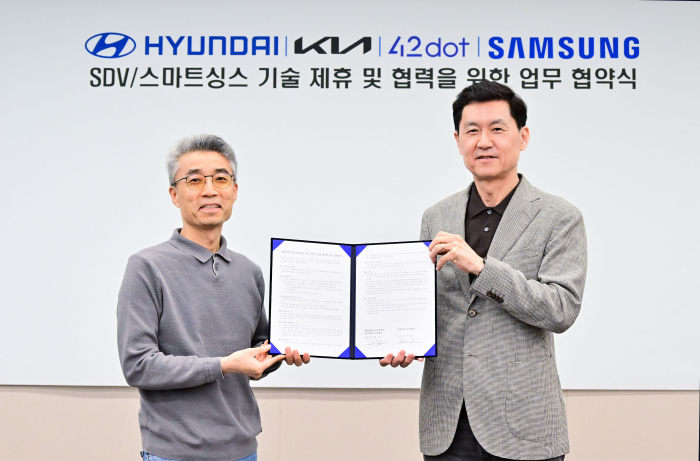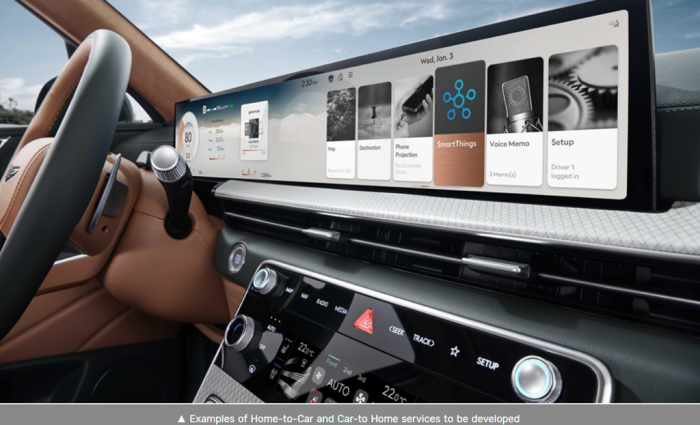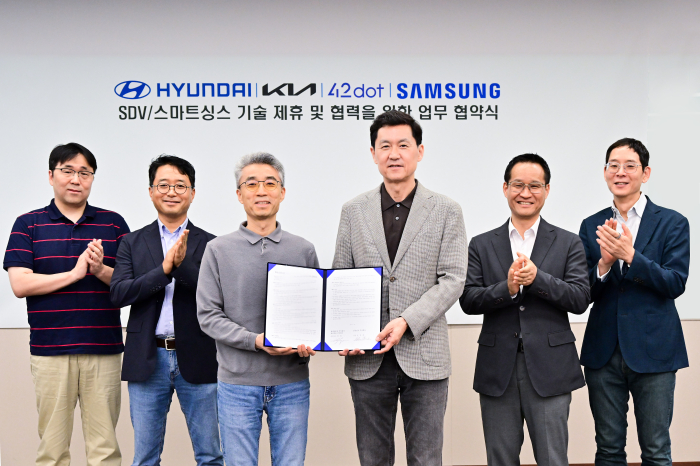Hyundai partners with Samsung to enhance connected vehicle technology
Under the strengthened partnership, the two groups aim to lead the connected vehicle and smart home segments
By Sep 25, 2024 (Gmt+09:00)
South Korea’s Rznomics inks $1.3 bn out-licensing deal with Eli Lilly


Korea’s aesthetic medicine enjoys golden era with surge in foreign spending


In China’s waterway city Hangzhou, K-beauty redefines ‘shuiguang'


When in S. Korea, it’s a ritual: Foreigners make stops at CU, GS25, 7-Eleven


Kumho Tire shuts Gwangju plant after fire, derailing record sales run



South Korea’s Hyundai Motor Group has joined forces with Samsung Electronics Co. to advance connected vehicle technology utilizing the tech giant’s SmartThings, an Internet of Things platform.
The two conglomerates on Wednesday signed a memorandum of understanding to strengthen their strategic technology partnership.
Under the initial agreement, Hyundai Motor Group’s flagship units – Hyundai Motor Co., Kia Corp. and self-driving technology affiliate 42dot Inc. – will closely work with Samsung to advance the automaker’s software-defined vehicles (SDVs).
Hyundai and Kia, Korea’s two largest automakers, are gearing up for the SDV era, where various AI-enabled in-vehicle infotainment services are available through an open mobility ecosystem.
Hyundai Motor Group aims to unveil such vehicles as early as 2026.

“Our goal is to enrich Hyundai and Kia customers’ mobility experience by offering personalized services that extend beyond transportation, seamlessly integrating vehicles with smartphones,” said Chang Song, president and head of Hyundai Motor Group's Advanced Vehicle Platform (AVP) Division.
Paul (Kyung-whoon) Cheun, chief technology officer of Samsung’s Device eXperience (DX) Division and head of Samsung Research, said: “Through our collaboration with Hyundai and Kia, customers will experience the convenience of SmartThings not only at home but also in their vehicles, transcending space.”
SMARTTHINGS FIND, GALAXY QUICK PANEL
Under their partnership, the automakers will introduce a vehicle location service based on Samsung’s SmartThings Find platform.

The service is accessible via a crowdsourced network of hundreds of millions of Samsung Galaxy devices that use Bluetooth Low Energy (BLE) technology to report their location.
Through SmartThings Find, users can locate vehicles using nearby Galaxy smartphones – even without a 4G or 5G cellular network connection – meaning drivers can more easily track down their cars when they are lost or stolen.
Through the Galaxy smartphone’s Quick Panel, drivers can also control vehicle air conditioning and check the remaining electric vehicle driving range.
By registering vehicles with the connected SmartThings ecosystem, users, while driving home, can control their Samsung air conditioners, air purifiers or other connected devices at home.

The partners said they will use in-vehicle cameras and the Galaxy wearable devices to monitor the driver’s condition and create an optimal in-vehicle environment for pets.
In January, Samsung and Hyundai announced they will collaborate to offer “home-to-car” and “car-to-home” services that connect smartphones, vehicles and home appliances in their joint push to lead the connected car and smart home segments.
Hyundai Motor Group said it will hold its 2025 Developer Conference in the first half of next year to unveil plans to build software development kits (SDKs), with which external developers can directly participate and develop “killer apps” to create a vehicle app market for software-defined vehicles.
Write to Jeong-Soo Hwang at hjs@hankyung.com
In-Soo Nam edited this article.
-
 Tech, Media & TelecomSamsung expands AI horizon with B2B-specific SmartThings Pro
Tech, Media & TelecomSamsung expands AI horizon with B2B-specific SmartThings ProSep 10, 2024 (Gmt+09:00)
3 Min read -
 Future mobilitySamsung, Hyundai Motor in joint push for connected cars
Future mobilitySamsung, Hyundai Motor in joint push for connected carsJan 04, 2024 (Gmt+09:00)
2 Min read -
 Future mobility42dot to lead Hyundai Group's in-vehicle software R&D
Future mobility42dot to lead Hyundai Group's in-vehicle software R&DDec 29, 2023 (Gmt+09:00)
2 Min read -
 Korean innovators at CES 2024Hyundai’s 42dot, Samsung to develop AI-powered SDV platform
Korean innovators at CES 2024Hyundai’s 42dot, Samsung to develop AI-powered SDV platformJan 10, 2024 (Gmt+09:00)
2 Min read -
 ElectronicsWith Samsung’s connected gadgets, it’s ‘home, smart home’
ElectronicsWith Samsung’s connected gadgets, it’s ‘home, smart home’Oct 06, 2023 (Gmt+09:00)
4 Min read -
 Korean Innovators at CES 2023With SmartThings Station, Samsung wants a more connected world
Korean Innovators at CES 2023With SmartThings Station, Samsung wants a more connected worldJan 05, 2023 (Gmt+09:00)
3 Min read -
 Future mobilityAutonomous driving startup 42dot plans Level 4 self-driving in Seoul
Future mobilityAutonomous driving startup 42dot plans Level 4 self-driving in SeoulDec 21, 2020 (Gmt+09:00)
1 Min read


